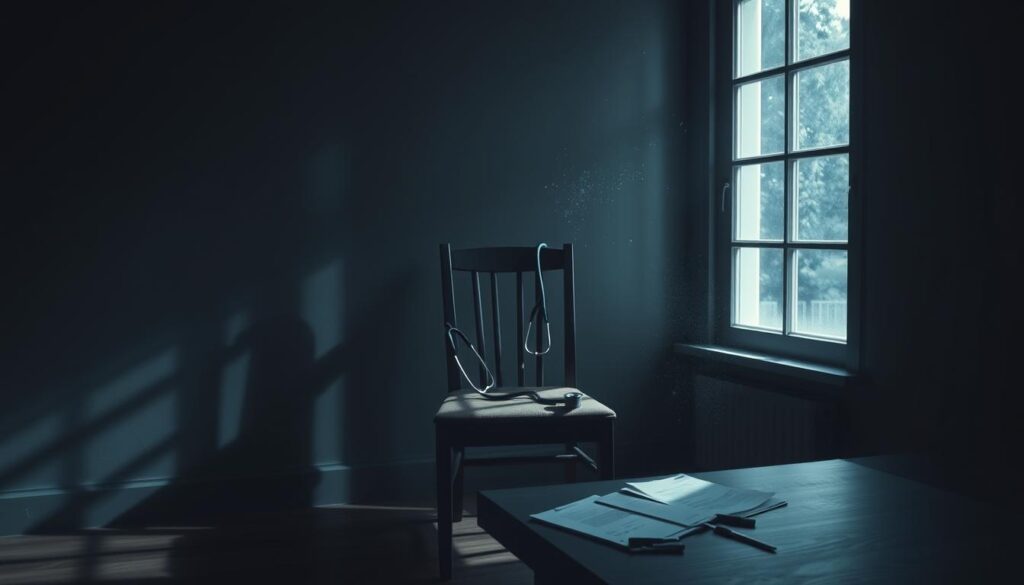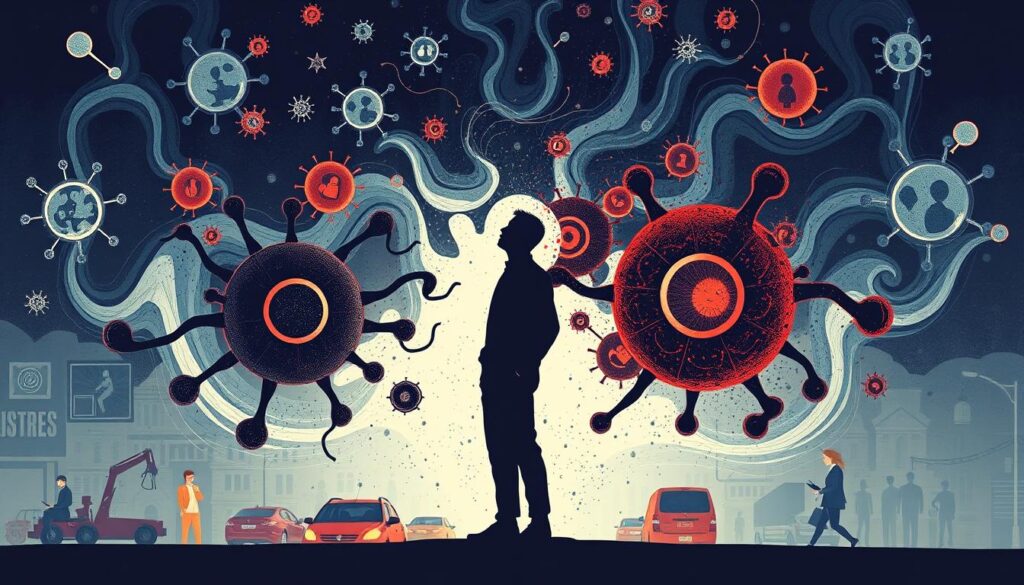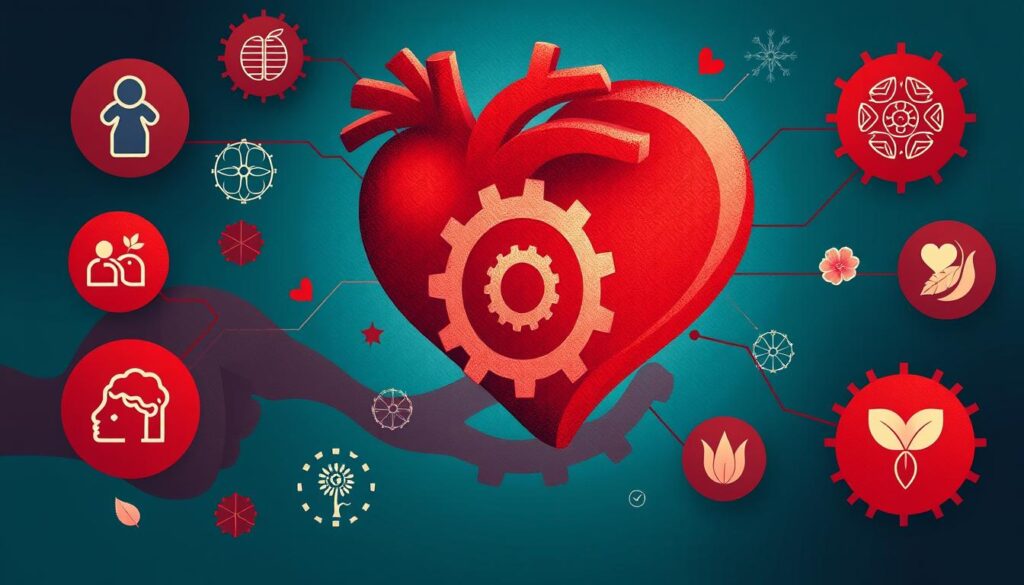Low sex drive, or decreased libido, is common in men. It affects about one in five men. It can make you less interested in sex and hurt your life and relationships.
Many things can lower a man’s sex drive. Hormonal imbalances, medical issues, and certain medicines are some. Psychological factors and lifestyle choices also play a part. Signs include wanting sex less, trouble getting or keeping an erection, and feeling tired.
Seeing a doctor is key to finding and fixing the problem. By tackling the cause, you can boost your sex drive and feel better overall.
Key Takeaways
- Low sex drive affects around 1 in 5 men, with symptoms including reduced sexual interest and difficulty with erections.
- Causes of low libido include hormonal imbalances, medical conditions, medications, psychological factors, and lifestyle choices.
- Seeking medical attention is crucial for identifying and addressing the root causes of decreased sexual desire.
- Addressing underlying issues can help restore your sexual health and improve your overall well-being.
- Understanding the potential causes of low libido is the first step in taking control of your sexual function.
Understanding Male Libido and Sexual Health
Your sexual desire, or libido, can change over time. There’s no one right amount of sex drive. If you notice a big drop in your desire, it might mean something’s off.
Knowing what affects your libido can help keep your sex life healthy and happy.
Defining Normal Sex Drive
Your normal sex drive is very personal. It can change based on your age, health, relationship, and hormones. A 2019 study found about 1 in 20 men over 45 had low libido.
Talking openly with your partner and doctor can help figure out what’s normal for you.
Signs of Low Libido
- Reduced interest or enthusiasm for sexual activity
- Difficulty becoming physically aroused or maintaining arousal
- Fewer sexual thoughts or fantasies
- Avoidance of sexual intimacy with your partner
Impact on Quality of Life
Low sex drive can really hurt your life. It can mess with your relationships, how you feel about yourself, and your happiness. Up to 1 in 5 men may lose libido at some point.
Fixing the reasons for low libido can make your sex life better. It can also make you feel happier and healthier.
“Testosterone plays a crucial role in regulating sexual function and other health aspects.”
Hormonal Factors Affecting Male Sex Drive
Keeping a healthy sex drive is key for men. But, many hormonal factors can lower a man’s libido. We’ll look at how testosterone, age, and endocrine system issues affect sex drive.
Role of Testosterone
Testosterone is the main male sex hormone. It helps with libido, sperm, and sexual function. Normal testosterone levels are between 300 to 1,000 ng/dL.
If testosterone drops too low, it’s called androgen deficiency. This can make sex drive very low.
Age-Related Hormonal Changes
As men get older, testosterone levels go down. This can make sex drive lower. But, most men still have some interest in sex in their 60s and 70s.
Endocrine System Disorders
Issues with the endocrine system can also lower sex drive. Problems like thyroid imbalances, pituitary gland dysfunction, and testicular disorders can mess with hormones. This can make sex less appealing.
In some cases, hormone replacement therapy might help. But, always talk to a doctor first. They can help figure out the best plan for you.
“Open communication with healthcare providers is crucial for receiving appropriate treatment for a loss of sex drive.”
Knowing how hormones affect sex drive helps men talk to doctors. Together, they can find the cause and fix it.
What Causes Low Sex Drive in a Man
Many men face a drop in sexual desire. Hormonal imbalances, medical issues, and lifestyle choices can cause this. Even some medications and psychological factors play a role.
Testosterone deficiency is a big reason for low libido in men. As men get older, their testosterone goes down. This is especially true for men over 60.
Medical problems like cardiovascular issues, diabetes, and sleep disorders can lower sex drive. Also, some medicines, like antidepressants, can make it worse.
Psychological factors are important too. Relationship problems, high stress, and low self-esteem can lower sex drive. Bad sexual experiences can also affect a man’s desire.
Lifestyle choices matter too. Too much alcohol, bad sleep, and not moving enough can hurt libido. But, exercise and managing stress can help.
It’s key to find out why a man’s sex drive is low. Talking to a doctor is the first step. With the right help and changes, many men can feel better about sex.
| Factors Impacting Male Libido | Impact on Sexual Desire |
|---|---|
| Testosterone Deficiency | Significant decrease in sex drive |
| Cardiovascular Issues | Reduced blood flow and sexual function |
| Diabetes and Metabolic Disorders | Nerve damage and hormonal imbalances |
| Sleep Disorders | Fatigue and hormonal disruptions |
| Antidepressants and Medications | Decreased libido as a side effect |
| Relationship Issues and Stress | Negative impact on sexual desire and performance |
“Many men struggle with perceived low libido, and the concept of ‘normal’ libido can vary greatly from individual to individual.”
– Christopher Brett-Renes, Psychosexual Therapist
Medical Conditions and Chronic Diseases
Chronic illnesses can really hurt a man’s sex drive. Heart disease and high blood pressure can cut down blood flow. This affects sex function and desire.
Diabetes and metabolic syndrome can mess with hormones and nerves. This makes sex less interesting. Sleep disorders, like sleep apnea, can lower testosterone and make you tired. This also lowers sex drive.
Other issues like chronic illness, being overweight, and chronic pain can also lower sex drive. It’s key to manage these health problems to boost sex life. Men with cancer might face sexual problems too, due to the cancer or treatment.
Cardiovascular Issues
Heart problems can really hurt a man’s sex life. Heart disease and high blood pressure can make it hard to get an erection. This can lead to erectile dysfunction and less interest in sex.
Diabetes and Metabolic Disorders
Diabetes and metabolic disorders can also lower sex drive. They can mess with hormones and nerves. Keeping blood sugar in check and managing metabolic issues is key for better sex health.
Sleep Disorders
Sleep disorders, especially sleep apnea, can lower testosterone and make you tired. This can make sex less appealing. Fixing sleep problems can help balance hormones and boost libido.

“Around one in five men have a low sex drive, and managing underlying health conditions is crucial for improving sexual health.”
Psychological Causes of Decreased Libido
Your mental health affects your sexual desire. Depression can make you lose interest in things you used to enjoy, like sex. Anxiety, especially about performing well, can make you shy away from sex. Stress from work, relationships, or money can also lower your libido by raising cortisol levels and messing with hormones.
Feeling bad about yourself or your body can also lower your sexual desire. Getting help for these issues through therapy and medicine can help bring back your libido.
A global study found that about 28% of men sometimes have low libido. Around 4% have it all the time. It’s important to find and deal with the psychological reasons for low libido to improve your life and relationships.
| Psychological Factor | Impact on Libido |
|---|---|
| Depression | Decreased interest in sex and other enjoyable activities |
| Anxiety | Avoidance of sexual encounters due to performance concerns |
| Stress | Increased cortisol levels interfering with hormone production |
| Low self-esteem and body image issues | Reduced sexual desire and confidence |
Getting professional help, like therapy or counseling, can help fix the psychological reasons for low libido. It can also help restore your sexual health.
“Addressing the psychological factors affecting your sexual drive is crucial for improving your overall quality of life and intimate relationships.”
Medications That Can Lower Sex Drive
Having a healthy sex life is key for feeling good. But, some medicines can mess with your desire for sex. It’s important to know how medicines can affect you and talk to your doctor about it.
Antidepressants and Mental Health Medications
Antidepressants, especially SSRIs, can lower your sex drive. They change how your brain works, making it hard to want sex. If you’re on antidepressants, talk to your doctor about how they might affect your sex life.
Blood Pressure Medications
Some blood pressure medicines, like beta-blockers, can also lower your sex drive. They can mess with your hormones and make it hard to get excited. If you’re on these medicines and don’t feel like having sex, talk to your doctor about other options.
Other Prescription Drugs
Many medicines, not just antidepressants and blood pressure medicines, can affect your sex drive. This includes medicines for hair loss, cancer treatments, and some pain relievers. If you start a new medicine and don’t feel like having sex, tell your doctor.
Fixing low libido from medicines often means finding new treatments or changing doses. Working with your doctor can help you keep a healthy and happy sex life.
Lifestyle Factors Impacting Sexual Desire
Your lifestyle choices can really change your male libido. Too much alcohol can lower your testosterone. This makes you less interested in sex. Smoking hurts blood flow and raises the chance of erectile problems. Drug use, like marijuana, messes with hormones and sex.
Being too still and eating badly can make you fat. This hurts your libido. But, exercising, eating right, and cutting down on booze and smokes can boost your sex drive.
| Lifestyle Factor | Impact on Libido |
|---|---|
| Alcohol Consumption | Lowers testosterone, decreases sexual desire |
| Smoking | Negatively impacts blood flow, increases risk of erectile dysfunction |
| Drug Use | Interferes with hormone production and sexual function |
| Sedentary Lifestyle | Leads to obesity and other health issues that affect libido |
Changing your lifestyle can help a lot. Try regular exercise, a balanced diet, and cut down on alcohol and tobacco. This will keep your sex drive healthy and make you feel better overall.
“Maintaining a healthy lifestyle is key to sustaining a satisfying sex life.”
The Connection Between Stress and Libido
Stress can really lower a man’s sex drive. It messes with the body’s hormones. When you’re stressed, your body makes more cortisol, the “stress hormone.”
This extra cortisol can stop testosterone production. Testosterone is key for a good sex drive.
Work-Related Stress
Stress from work can be a big problem. Long hours and too much pressure can make you tired. You might not want to have sex.
Managing your time better and setting limits can help. Also, relaxing can boost your libido.
Relationship Issues
Stress in relationships can hurt your sex drive too. Conflicts and not feeling close can make it hard to want sex. Getting help from a counselor can fix these problems.
Financial Pressures
Money worries can stress you out a lot. Debt and job fears can make you feel drained. This can make you not want to have sex.
Trying stress-reducing activities like meditation can help. It can lessen the stress money problems cause.
Fixing the stress causes is key to a good sex drive. Use stress management techniques, get relationship counseling, and take care of yourself. This can help control your cortisol levels and boost your sex drive.

Exercise and Physical Activity Effects
Regular exercise can really boost your male libido. It improves your heart health, boosts testosterone, and lowers stress. This can greatly improve your sex drive and performance. Try to do 150 minutes of aerobic activity each week for the best results.
But, finding the right balance is key. Too much endurance training can lower testosterone, which might reduce your sex drive. Yet, strength training and HIIT can raise testosterone and improve your sex life.
Your heart health, how hard you exercise, and your fitness level all matter for a healthy sex drive. Mix cardio, strength training, and flexibility exercises for a well-rounded fitness plan. This will help you enjoy a more fulfilling intimate life.


A Life-Changing Experience with This Weight Loss Supplement (Nagano Tonic)
I’ve always struggled with finding a weight loss solution that actually works for me. Like many, I’ve tried numerous diets, exercise routines, and supplements over the years—some worked for a short time, but nothing ever gave me long-term results. That was until I decided to try the weight loss supplement I found : Link to the Supplement.
From the moment I started using it, I noticed a difference. Not only did I feel more energized, but my cravings also became more manageable. The best part? I started seeing results much quicker than I anticipated! Over the course of just a few weeks, I noticed a significant reduction in belly fat and overall weight loss that I hadn’t been able to achieve before.
What makes this supplement stand out from all the others I’ve tried is how it supports me in my daily routine without any jitters or energy crashes. I’m able to stay focused and motivated, which has made it easier to stay on track with my diet and exercise plan.
This product truly exceeded my expectations, and I feel more confident and healthier than ever before. If you’re struggling with your weight loss journey like I was, I highly recommend giving this supplement a try. It’s been a game-changer for me, and I’m sure it can work wonders for you too!
Contant Them on email .. tonicnagano50@gmail.com
I’ve tried so many weight loss products over the years, but nothing worked like this supplement! Since I started using it, I’ve noticed a big difference in my energy levels and appetite control. In just a few weeks, I’ve lost weight and feel so much better. It’s been easy to stick with, and the results speak for themselves. Highly recommend this to anyone looking to make a real change!
wasn’t sure what to expect, but this weight loss supplement has really impressed me! After just a few weeks of use, I’ve already dropped a few pounds and feel more motivated to stay active. It’s helped curb my cravings and boosted my energy throughout the day. I’m excited to keep going and see even better results. Definitely worth trying!
Reach them on tonicnagano50@gmail.com
This Nagano Tonic has been amazing! In just a few weeks, I’ve lost weight, feel more energized, and my cravings are under control. Highly recommend it!
Thats the link to purchase http://surl.li/iasppy